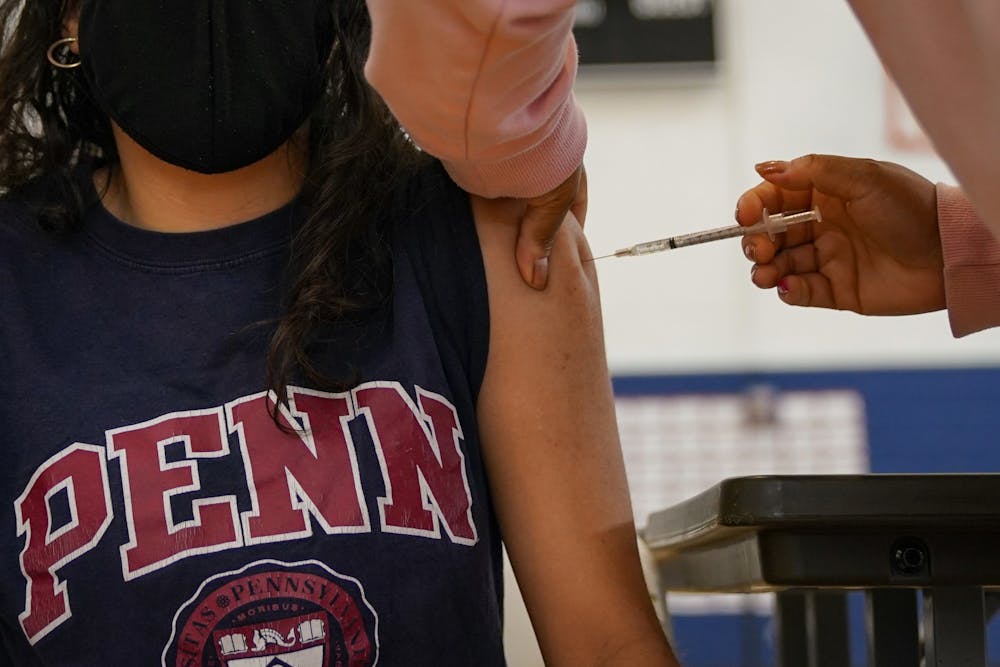As this term draws to a close, there’s a cautious optimism among Penn students. COVID-19 cases at Penn remain low, students are getting vaccinated, and Penn intends to hold in-person classes this fall, with vaccines required of all students.
This optimism is not unfounded. On a nationwide scale, President Joe Biden has surpassed his goal of 200 million shots in his first 100 days in office. More than half of those eligible in the United States have received at least one dose of the COVID-19 vaccine, and though our current average, around 60,000 reported cases a day, is far from perfect, it’s better than our peak of 300,000 cases a day in January.
Our vaccination efforts have escalated astronomically. All Americans over 16 are eligible to get the COVID-19 vaccine, with over three million shots being administered on some days. But lately, the average doses per day nationwide has been dropping below three million. Initial vaccination rates in several states have plateaued, and some mass vaccination sites are already closing.
Simultaneously, we’re seeing concerning trends in places like Michigan, where younger people are being hospitalized at higher rates. How do we react to the new problems that America is encountering: a lack of vaccine access, an excess of vaccine hesitancy, and premature shifts to pre-pandemic social behavior?
Trapped in the Penn Bubble, it can be easy to ignore these problems, especially when it seems like everyone around you is getting vaccinated. But nationwide, that couldn’t be farther from the truth. We are in a position of privilege, and we must recognize that and take action, lifting others up and putting an end to this pandemic for each and every one of us.
As younger students, we are adept at using technology in a way that older Americans are not, and have an unprecedented familiarity of the Internet. Securing a vaccine appointment shouldn’t depend on one’s internet access and ability to use it, but it often does. Over the past few months, appointment portals have crashed, second appointments have been canceled, and desperate public health officials have resorted to using Eventbrite for scheduling appointments.
Granted, it has gotten easier to get the vaccine. More sites nationwide are allowing walk-ins, and decreasing demand means that getting vaccinated is less of a free-for-all than before. But it’s still not easy, and vaccine access remains a problem. 71% of U.S. adults who want a shot have received one, but only 60% of Black and 55% of Hispanic adults who want a shot have gotten one, and this racial gap is widest among those making less than $50,000 annually. Looking at Philadelphia’s vaccination rates by race makes this disparity abundantly clear.
Just a few weeks ago, I struggled to schedule an appointment in New York because the registration link for my county-specific vaccination site redirected to another county’s site. I spent seven hours refreshing appointment websites, calling my state’s vaccine hotline, and searching Twitter for advice before I could secure an appointment.
SEE MORE FROM CAROLINE MAGDOLEN:
Using random housing assignments to build a stronger community
This was frustrating for me, a Gen-Z university student who was practically raised on the internet. How frustrating would this be for someone who rarely uses the internet, or lacks access to it? How frustrating would this be for someone who can’t take time off to search for vaccines like I did? I got my appointment, but I don’t know how many adults would have the time and resources to jump through hoops for theirs. If we can be more persistent and informed when securing our appointments, we can extend these traits to others by advising them on how to get vaccinated on social media, or by booking appointments for others directly as “vaccine fairies.”
The slowing rates of vaccination are also the result of vaccine hesitancy, stemming from partisan divides. Roughly one in five Americans refuse to get vaccinated. We need at least some of these Americans to get vaccinated: estimates for COVID-19 herd immunity ranges from 70-90% of the population, so herd immunity necessitates tackling vaccine hesitancy.
Even if much of Penn’s campus is getting vaccinated, it is essential that we talk to everyone we know to confirm their vaccination plans and help them get vaccinated if necessary. Not just our friends at Penn, but our friends back home, our family, our neighbors.Then, we tell them all to talk to their loved ones in turn. When we encounter vaccine hesitancy in our social circles, we must discuss it with empathy and understanding, since developing trust is essential to overcoming it.
Achieving herd immunity will be difficult, and there exist many barriers to vaccination for millions of Americans. But as “Zoom University” students, we are uniquely qualified to help other adults secure appointments and get vaccinated. What are we waiting for?
CAROLINE MAGDOLEN is a College and Engineering first-year student studying Systems Engineering & Environmental Science from New York City. Her email address is magdolen@sas.upenn.edu.









